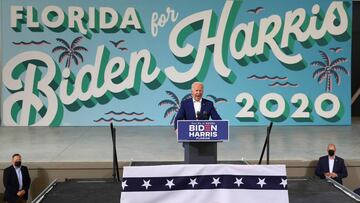USA Election 2020: why is Florida a key state for Trump and Biden?
The Sunshine State is powerful and predictably unpredictable. Why is the swing state always a key battleground between Republicans and Democrats?

Even though the polls are showing this week that Biden is increasing his lead over Trump in Florida since his covid-19 diagnosis, ever since 1996, the average margin of victory for presidential candidates in Florida is just 2.6 percentage points, by far the lowest of any state. Things could “swing” to the Republican incumbent, President Trump at any moment.
In 2016 Hillary Clinton lost Florida to Trump by just over 100,000 votes, just 1.2%. Over 9 million votes were cast.
Barack Obama had 51% in 2008, compared to John McCain’s 48.2. And in an unforgettable 2000 election, it came down to just 537 votes out of six million cast. Ultimately it was a recount and a Supreme Court decision that left George W Bush the winner.
Between 1900 and 2016, The Sunshine State has voted for the winning presidential candidate 76.67% of the time. In that same time frame, Florida supported Democratic candidates for president more often than Republican candidates. The state has voted for the winning presidential candidate in every election between 2000 and 2016.
Florida is a powerful state in elections
Florida has 29 electoral votes, which counts for 5.4% of the 538 electoral votes up for grabs and 10.7% of the 270 electoral votes needed to win the general election. Basically, the candidate chosen by Floridians has more than 10% of the electoral power of the country.
To exemplify quite how this weight of voting power affects campaign strategy, Florida was the first state in which Trump visited in person following his hospitalisation for covid-19. The President was followed closely by Joe Biden, who held his own rally in Broward.
Why does the vote in Florida always come so close?
In brief, it’s because Florida’s demographic makeup is very diverse, and constantly evolving. There’s a large Hispanic population (about 15%) but Cubans tend to vote more conservatively than one might expect.
There’s also a sizeable chunk of liberal Puerto Ricans. One worry for Democrats this year is that on the whole Hispanic voters aren’t wild about Joe Biden. According to the Herald-Tribune Clinton won Florida’s Hispanic vote by 27 percentage points, but an August poll by the Democratic firm Equis Research showed Biden up by just 16 points with the same voters.
Florida is also home to Republican-leaning zones like Duval County and Jacksonville, which have more liberal college towns too.
The front lines of the battleground are generally clear. Democrats dominate from Miami to Palm Beach, while Republicans have their stronghold across north and southwest sections of the state.
These diverse demographics are also always in flux, making it an unpredictable state to call every four years. You’ve got black American families whose ancestors left the south in the early 20th century, but are now starting to move back. The number of young voters as well as the Hispanic population is gradually increasing, but this is balanced by the increasing number of seniors who consistently flock to Florida to retire in the sun. The seniors tend to vote more reliably than young people. There are a lot of moving parts.
“It’s diverse in terms of race and ethnicity and also ideology,” said Sharon Austin, a professor of political science talking to the New Statesman. “Regardless of your position, you’re bound to offend someone.”
A year of controversy in Florida's voting law
It’s no wonder that with so much at stake, so far in 2020 there have been numerous campaigns and counter-campaigns surrounding voter rights in Florida.
Tellingly, although Trump has generally tried to discredit mail-in voting, he tweeted that mail-in voting was safe in Florida, perhaps a sign that he knows he needs the votes of Florida’s many retirees. Some see this as the reason they believe Biden will win the state this time, the year that the Trump administration has handled the pandemic catastrophically, disproportionately affecting the ageing population. Whether this anger will be balanced out by the lower turnout due to fear of getting sick, or fear that mail-in voting isn’t safe remains to be seen.
In May, several groups sued the state of Florida, arguing that the postage required for mail-in ballots amount to no less than an “unconstitutional poll tax”. The mail-voting issue is even more important this year than ever before.
An appeals court controversially ruled in September that ex-felons need to pay all fines related to their offence before their right to vote is restored. An estimated 1.4 million voters will be disenfranchised by this decision.
Related stories
In September, the voter registration site in for Florida crashed after over 1.1million requests were received…per hour. The state subsequently extended the registration deadline.
Florida Gov. Ron DeSantis is extending the state’s voter registration deadline by one day after heavy traffic crashed the state’s online system and potentially prevented thousands of enrolling to cast ballots in next month’s presidential election. https://t.co/ukVfFiAb1A
— The Associated Press (@AP) October 6, 2020
Floridians, all the information you need to vote and safely is in our guide.


